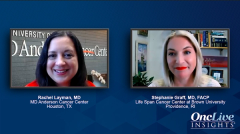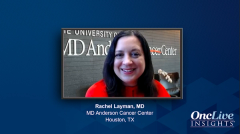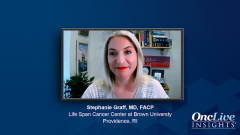
Implementing Trial Data to Our Practice
Stephanie Graff, MD, and Rachel Layman, MD, discuss how they would apply the results of the monarchE trial to clinical case scenarios.
Episodes in this series

Transcript:
Stephanie Graff, MD, FACP: Back to our case, we have a 39-year-old with 5 positive lymph nodes. We have treated with lumpectomy and axillary lymph node dissection, adjuvant chemotherapy, radiation, ovarian function suppression, plus aromatase inhibitor, plus 2 years of adjuvant abemaciclib [Verzenio]. She completes her 2 years of adjuvant abemaciclib and now is going to continue on her adjuvant endocrine therapy for 5 to 10 years.
The question is: how would things change in different situations for this patient? I think I already asked if her Ki-67 had been lower, if you would have changed your opinion, and I think you gave me an emphatic no. I think that would be my answer too. What if she hadn’t been so healthy? We said no comorbid illnesses, ECOG performance status of 0. How do you feel about adjuvant abemaciclib or adjuvant CDK4/6 inhibitors for patients that have other health issues?
Rachel Layman, MD: For this very young patient, she would probably have to have a very significant comorbidity that I don’t think would impact her long-term outcome. So, someone so young, if she would develop metastatic breast cancer that would significantly reduce her overall survival that is expected. I think in someone young, premenopausal, I really do think that we have to try to do the best that we can in giving the optimal therapies but make adjustments when it’s not working out.
I think it’s a little different in older patients. I think the older patients are probably going to be on more medications. There are more potential drug interactions, especially ribociclib in particular with the QT prolongation may interact with some medications that patients are on. Fortunately, our patient wasn’t on any medications so that makes it easy. I think that it’s all about having a very frank and open, honest discussion with the patient about the potential risks and benefits. I think it’s important to offer them the therapy. I think it’s also important to give them permission to stop taking the therapy if things are going very poorly after having a discussion and doing everything you can to involve other members of your team, supportive care, RnDs [Research and Development] to help give them all the support that they need to try to get through it.
Stephanie Graff, MD, FACP: I completely agree, and I anticipate that at some point in the future we’ll see approval for ribociclib based on [the] NATALEE [trial] [NCT03701334] as well. I think that we’re going to be in a space where we are choosing based on the exact elements that you were just describing. If the patient has a history of IBS [irritable bowel syndrome] with diarrhea, maybe we’re not going to be choosing abemaciclib for that patient. If they have a history of elevated LFTs [live function tests], it might be harder to choose ribociclib if they’re on medicines that cause QT prolongation. It will be harder to choose ribociclib and so we’re going to be kind of matching the patient with their journey.
Transcript edited for clarity.








































